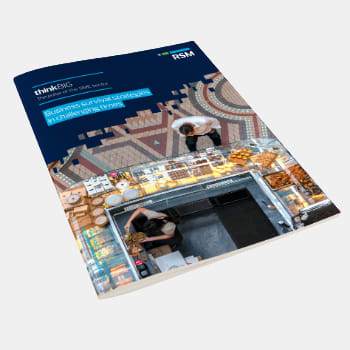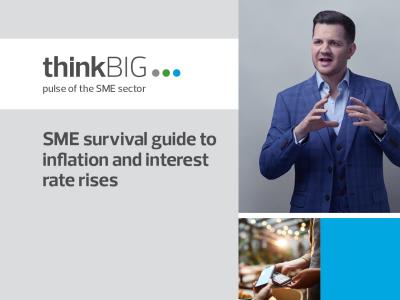How do you keep your business on course when the global economy is teetering?
The answer lies in equipping yourself with the right strategies.
In our latest thinkBIG report, we leverage the collective knowledge and experience gained over 102 years of business to help you navigate the challenges ahead.
Whether your business is barely surviving, achieving record profits, or somewhere in between, this report provides invaluable insights to help you navigate today’s volatile economic landscape. As the global situation continues to impact Australian businesses, it’s more important than ever to stay informed and prepared.
In this report:
- Understand the current global situation and its impact on businesses across Australia.
- Explore the major challenges businesses are facing, including tax debt, rising interest rates, inflation, labour shortages, complex government policies and poor business practices.
- Gain insights into the unique difficulties confronting sectors such as healthcare, property and construction, retail and hospitality, manufacturing, and non-profits.
- Access practical, data-driven strategies designed to help businesses of all sizes weather the economic storm.
- Discover options for dealing with financial struggles, including small business restructuring, members' voluntary liquidation, and guidance on handling personal debt after liquidation.
- Hear from real clients who have overcome adversity and emerged stronger, offering inspiration and proven strategies for success.
It’s a tough environment to operate in, and there’s no one-size-fits-all solution.
But with the right strategies, you can not only survive but thrive.
Inside the ThinkBIG report, we’ve broken down the most pressing business challenges and offered tailored solutions to each.
Managing tax debt
The ATO is intensifying efforts to collect on billions of dollars in overdue tax debts, leading to an influx of payment reminders, rejected payment plans, and more severe measures like garnishee notices, director penalty notices and wind-up notices. If left unchecked, these actions can devastate your business.
Interest rate hikes
The increased cost to service loans is eating into profits, and difficulty obtaining new loans is forcing some business owners to tap into personal finances to keep their businesses afloat.
Inflation and cost management
Post-COVID spending surges have caused a significant rise in the cost of materials, wages, and insurance. Inflation is eroding profit margins across multiple industries.
Labour shortages
Despite an increase in migration, the skills gap continues to widen. Businesses are finding it harder than ever to recruit and retain the right talent.
Complex government policies
For sectors like construction and healthcare, convoluted government policies are creating barriers to growth.
Poor business practices
While the external economic environment presents obstacles, the biggest challenge we see affecting businesses in all sectors is poor business practices.
Key strategies
- Negotiate effectively with the ATO.
- Proactively manage tax obligations.
- Develop payment plans that won’t cripple your cash flow.
- Learn how to restructure debt.
- Optimise interest payments.
- Adjust your financial strategies to minimise the impact of rising rates.
- Optimise supply chain costs.
- Implement efficient procurement practices.
- Creative ways to attract skilled workers
- Methods to retain top talent during challenging times.
- Strategies for upskilling existing employees to fill critical roles.
- Stay compliant while positioning yourself for long-term success
- Explore the Small Business Restructuring process.
- Cashflow management, staying on top of invoicing and keeping timely records are essential business practices.
No two industries are affected in the same way by the economic downturn.
RSM takes a deep dive into the unique challenges facing key sectors and offers specific strategies to address them.
Healthcare
Providers are grappling with decreased consumer spending and ongoing battles with insufficient bulk billing rebates.
Construction
Companies are seeing profit margins shrink due to rising material costs and labour shortages from previously signed fixed-price contracts.
Retail and hospitality
Businesses are facing dwindling revenues as consumer discretionary spending shifts.
Manufacturers
Are struggling to maintain healthy profit margins due to the rising cost of raw materials.
Non-profit organisations
Are battling higher wages, labour shortages, and reduced access to grants, even as demand for services increases.
Key strategies
- Solutions for optimising operational efficiency and managing financial stress.
- Ways to renegotiate terms, optimise resource allocation, and future-proof businesses against further cost increases.
- Adjust pricing models, offer unique value propositions, and stay relevant in an unpredictable market.
- Tactics for reducing costs, improving operational efficiency, and securing better supply chain terms.
- Learn how to manage cash flow and secure alternative funding sources in this challenging environment.
Strategy advice for weathering the storm
At RSM, we don't just identify problems—we provide actionable solutions. Here are just a few of the strategies you’ll find inside our thinkBIG report:
During tough times, focus on refining vision and strategy, ensuring sustainable pricing models, and implementing diligent financial practices.
The increased cost to service loans is eating into profits, and difficulty obtaining new loans is forcing some business owners to tap into personal finances to keep their businesses afloat.
Post-COVID spending surges have caused a significant rise in the cost of materials, wages, and insurance. Inflation is eroding profit margins across multiple industries.
Difficult times demand specialist skillsets, and you need to be making confident decisions because they do affect your business, family, and livelihood.
Work with an asset protection specialist who can help you make smart, tax-effective decisions that safeguard your assets while considering all possible risks.
Not paying your tax bill won’t make ATO debt disappear. Seek guidance from a restructuring and recovery expert who can help you avoid actions that might have negative repercussions down the line.
In cases where liquidation of a company has not resolved debts that carry personal liability, such as secured loans or tax obligations, directors can become understandably stressed about what this means for their personal assets.
Whatever situation eventuates for you, taking a determined and controlled approach to rejuvenating or winding down a distressed business is a much more effective strategy than letting it unravel without a plan. By understanding your options and making conscious choices along the way, you honour the effort you’ve invested and give your business the respect it deserves.
Key strategies:
Informal debt agreements
For lower debt amounts, informal debt agreements are generally possible and can be negotiated in such a way that the debt amount is very reasonably compromised.
Personal Insolvency Agreement (PIA)
One of the key benefits of a PIA over an informal debt agreement is that it provides certainty by addressing all known and unknown creditors, preventing them from pursuing you in the future.
Bankruptcy
A PIA is not for everyone, and when you have struggled under the weight of substantial debt for some time and are eager for a fresh start, declaring bankruptcy may actually be your best option. It can be quite rehabilitating, allowing you to draw a line in the sand between your past and future, and giving you a fresh start.
Report Contributors























